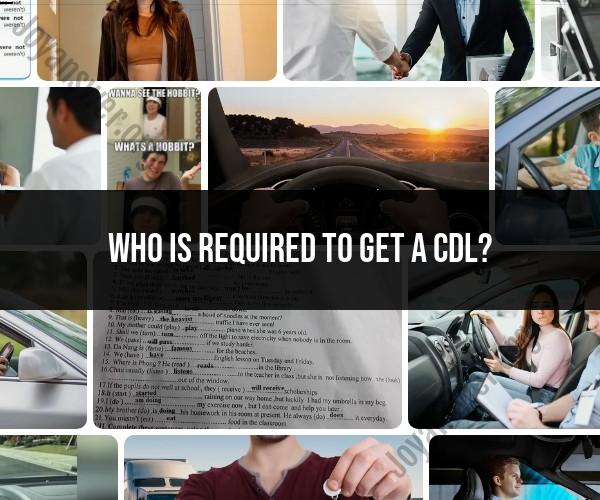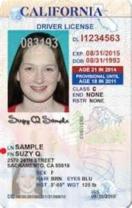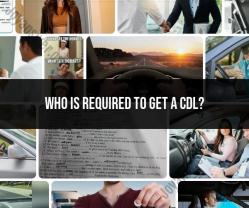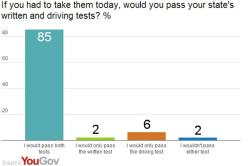Who is required to get a CDL?
A Commercial Driver's License (CDL) is required for individuals who operate certain types of vehicles for commercial purposes. The specific requirements for obtaining a CDL can vary by jurisdiction (state or country), but generally, the following categories of drivers are required to have a CDL:
Large Trucks and Buses:
- Drivers who operate large trucks or buses with a Gross Vehicle Weight Rating (GVWR) of 26,001 pounds (11,794 kilograms) or more may need a CDL. This includes vehicles such as tractor-trailers, dump trucks, and buses designed to transport passengers.
Combination Vehicles:
- CDLs are required for individuals who operate combination vehicles, which consist of a towing unit (tractor) and one or more trailers. The specific weight limits for combination vehicles requiring a CDL depend on local regulations.
Hazardous Materials (Hazmat) Transportation:
- Drivers who transport hazardous materials in amounts that require placarding under Department of Transportation (DOT) regulations must have a CDL with a hazardous materials endorsement (H endorsement).
Passenger Transportation:
- CDLs are required for drivers of vehicles designed to transport a certain number of passengers. The threshold varies, but generally, if a vehicle is designed to transport 16 or more passengers (including the driver), a CDL is required.
School Bus Drivers:
- School bus drivers are typically required to have a CDL with specific endorsements for transporting students. The requirements for school bus drivers may include additional training and background checks.
Double/Triple Trailers:
- Drivers who operate double or triple trailer combinations may need a CDL. This involves towing two or three trailers behind a single tractor.
It's important to note that the specific requirements, endorsements, and classifications of CDLs can vary by jurisdiction. Additionally, some states have additional regulations or exemptions for certain types of vehicles or specific industries.
To obtain a CDL, individuals usually need to pass written knowledge tests, undergo skills testing (including a road test), and meet other eligibility criteria, such as age and medical fitness requirements. Training programs, often offered by truck driving schools, can help individuals prepare for the CDL exams and gain the necessary skills for safe commercial driving.
As requirements can change and may be subject to local variations, individuals interested in obtaining a CDL should check with their state's Department of Motor Vehicles (DMV) or equivalent licensing agency for the most up-to-date and specific information.
Who needs to obtain a Commercial Driver's License (CDL)?
You need to obtain a Commercial Driver's License (CDL) if you plan to operate any of the following types of vehicles commercially in the United States:
Vehicles requiring a Class A CDL:
- Any combination of vehicles with a Gross Vehicle Weight Rating (GVWR) of 26,001 pounds or more, where the towed vehicle (trailer) has a GVWR of 10,000 pounds or more. This includes:
- Tractor-trailers (semis)
- Tandem axle straight trucks
- Buses carrying 16 or more passengers (including the driver)
Vehicles requiring a Class B CDL:
- Single vehicles with a GVWR of 26,001 pounds or more, or any such vehicle towing a vehicle with a GVWR of less than 10,000 pounds. This includes:
- Large single-unit trucks (box trucks, dump trucks)
- School buses
- Motorcoaches (tour buses)
Vehicles requiring a Class C CDL:
- Vehicles designed to transport 16 or more passengers (including the driver) but with a GVWR of less than 26,001 pounds. This includes:
- Small school buses
- Minibuses
- Party buses
In addition to the vehicle type, CDL requirements also apply to:
- Hazardous materials transportation: If you'll be transporting any hazardous materials requiring placards, you need a specific hazardous materials endorsement on your CDL.
- Intrastate vs. interstate commerce: Even if you only operate within your state, some states still require a CDL for certain types of commercial vehicles. Check with your state's Department of Motor Vehicles (DMV) for specific requirements.
Exemptions:
Some vehicle types and situations may be exempt from CDL requirements, such as:
- Recreational vehicles (RVs) used for personal use
- Farm vehicles used for agricultural purposes
- Military vehicles
Remember, it's crucial to consult with your local DMV to understand the specific CDL requirements in your state and ensure you comply with all regulations for the type of commercial vehicle you plan to operate.
I hope this clarifies who needs to obtain a CDL! Feel free to ask if you have any further questions about specific vehicles or CDL classifications.







